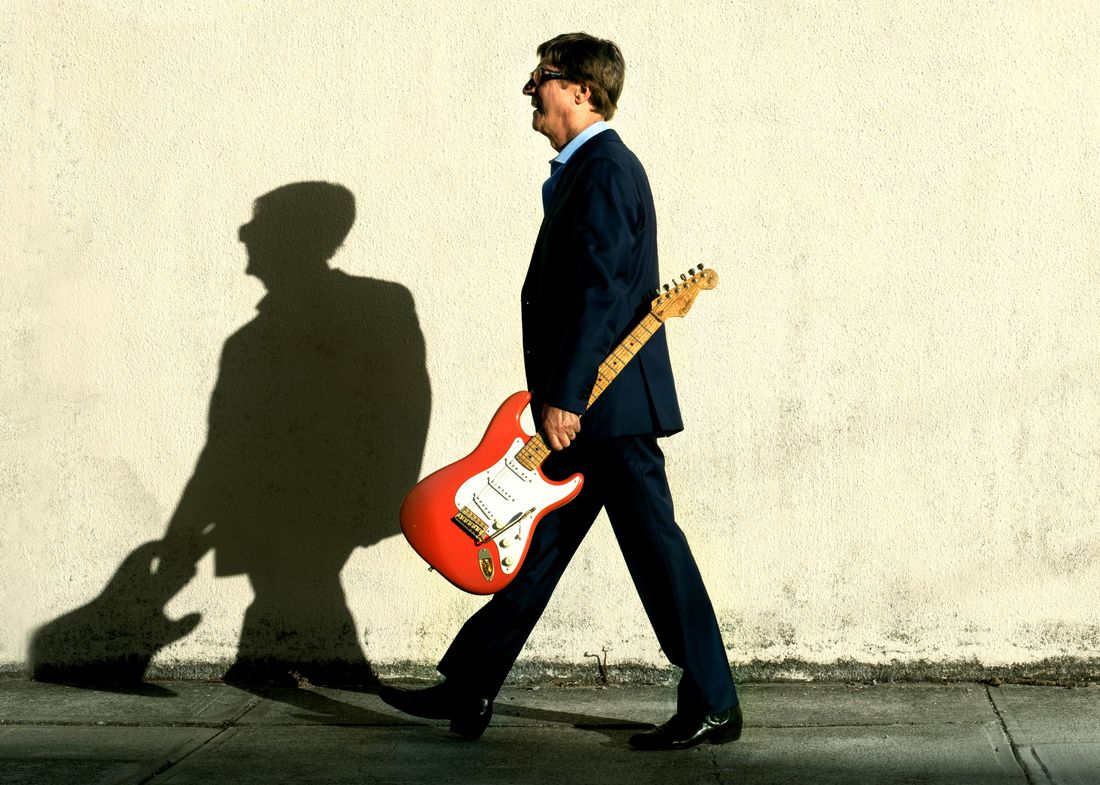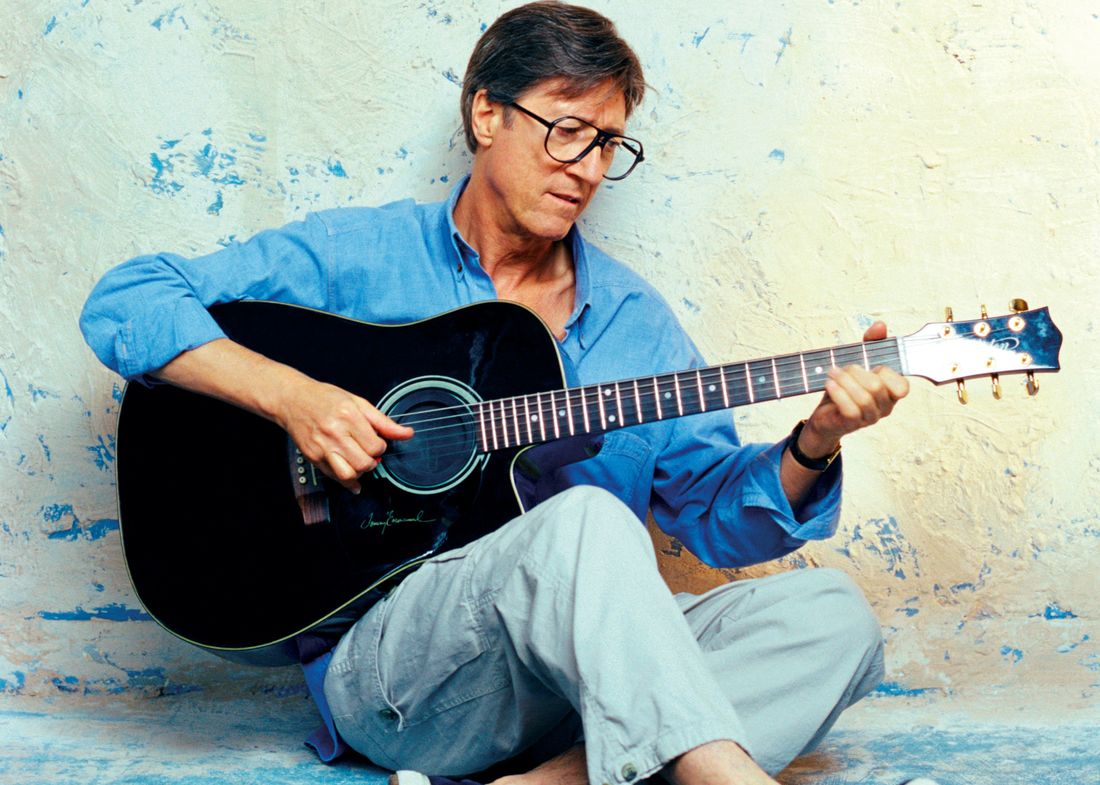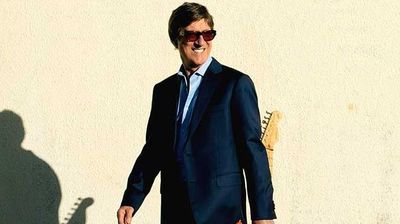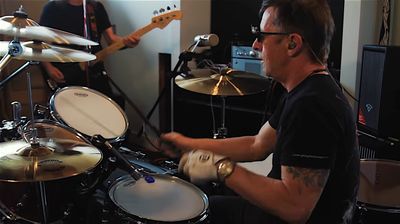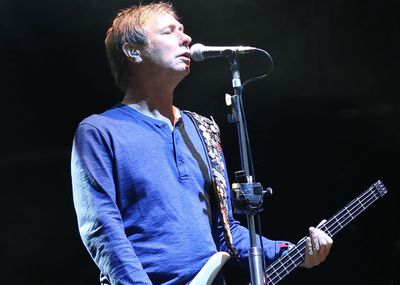|
Hank Marvin ranks along the likes of Les Paul and Jimi Hendrix as a true originator of the guitar. Influencing a generation of musicians as diverse as Paul McCartney and John Lennon, Black Sabbath’s Tony Iommi and Pink Floyd’s David Gilmour, the icon’s impact on popular music cannot be overstated. Back with a new album, we sat down with Hank for an EXCLUSIVE in-depth chat about his career; from Cliff Richard and The Shadows, to collaborating with The Who's Roger Daltrey and of course, the impact of ‘Apache’. Out of the shadows; Eamon O’Neill.
Hi Hank, how are you today?
I’m great, thank you. You’re back with the fantastically titled ‘Without A Word’; do you still get nervous every time you release a new album? Oh, definitely. I don’t think we as artists ever really know how it’s going to be received. We hope that what we’re singing or playing; the choice of material and the way we’ve arranged it, worked with it and interpreted it, hits the spot with our public. They could turn around and say; “that’s rubbish, that’s the worst thing you’ve ever done!”; you just never know. There’s quite an eclectic mix on the album; how did you go about choosing the tracks? I’m glad to say that Demon, the record company, gave me free reign on that one. They just left me with it, and I put forward the suggestion - and I’ve pretty much always done this - of recording tunes that I like, tunes I wish I’d written. I suggested the title ‘Without A Word’, and they came up with a few other things, and then they finally came back and said; “We like it. We’re going with that.” So the song choices are all favourites of yours? The choice of tunes, as you say, is eclectic. Things like ‘Moon River’ and ‘Alfie’, I think they’re just wonderful tunes, and fortunately, they work very well on the guitar. ‘Alfie’ is quite an interesting tune, melodically; it’s got some very interesting intervals in it. Initially it was quite complicated to try to put it together as a cohesive piece. You get an impression sometimes; you think you know it, and then you play the original and then you go; “Ah, actually, no, it doesn’t do that!” Did you have to sit down and listen to all the songs again to interpret them? Oh yeah, yeah. The thing is, you don’t want to destroy someone’s work, so it’s good to get a feel for the original. Then of course, as with ‘The Fool On The Hill’, we did a completely different approach to it. At least I knew the tune, and we could work from there. Some of the other tunes have a different kind of feel. How was it covering a pair of Beatles songs after having influenced The Beatles yourself; was it a case of things coming full circle? I suppose to a degree, yes, but their influences were very wide; they listened to black rhythm and blues, standards, all kinds of stuff, as we all did growing up. But I’ve always admired their writing ability, I mean particularly Paul and John, obviously. ‘Michelle’ is a really good piece of music; I love the major to minor moves in the chord sequence. It’s a great little tune, and on the original Beatles record, I always remember there was a guitar solo which I think Paul played, but I believe [producer] George Martin worked out, and I took that line and just syncopated it a little bit and played that on one of my gypsy guitars, just to bring a little bit of a French / gypsy feel. I didn’t think of it in a way of doing a tune of someone we influenced, it didn’t come to my mind at all, I just thought; “oh, these are two tunes which would work really well on guitar”, and they’re great tunes. The Doctor Who theme is probably the most unusual song choice on the album. ‘Doctor Who’ is a tune I’ve always admired from when it first came on the TV. That wonderful BBC Radio workshop with the oscillators creating the musical sounds was such an unusual piece of music at the time. It came to my mind because it had a great atmosphere. I didn’t even know it had a verse. My son Ben and I worked on the arrangements, we had a listen to a couple of versions, and we realised; “ah yes, it does have a verse, brilliant!” It’s not the only theme tune that you’ve tackled on this album. Another one that I admire very much is a Christopher Gunning piece, the theme from Poirot. It’s a fabulous tune. And then, ‘Peter Gun’; what a great tune. It’s been around since about 1958, ’59, maybe; what a great riff, and a slightly jazzy, bluesy melody. We really enjoyed that and making a mash-up with that and the other Mancini composition we used which was ‘Baby Elephant Walk’ from a movie called ‘Hatari!’. So yeah, there’s quite a mix of stuff on there, I agree. You mentioned collaborating with your son Ben; how does he stack up against the old man?
Ben’s a really good player. He was about fifteen or sixteen when he started playing seriously. He actually got grounded, and he asked me if he could borrow a guitar, and I said; “yeah, sure”, because he wasn’t going to go anywhere, as long as he’d done his homework. So I showed him a few minor / major scales, and he worked on those, and then he wanted me to teach him a couple of solos from Guns ‘N’ Roses records, so I had to listen to those and work them out, and show him how to play them. And I tell you what, he put some serious time in. About six months later I went to his room and I thought; “my goodness, he’s roaring around a bit – how did this happen? I’ve got some competition here!” It’s difficult to imagine Hank Marvin ripping through one of Slash’s solos. *Laughing* It didn’t come to my mind either! It was good for me to work it out and learn to play it, and try to do it note-for-note, because that’s what he wanted. You play melodies and things, as I’ve done most of the time, but I’ve done in the early days with Cliff [Richard and The Shadows] some rock and roll solos and things, and I’ve also played some gypsy jazz, and I enjoy that very much. I had a quartet for a while and we did a CD that was very well received in the USA. On the jazz radio charts we hit number one, which was quite brilliant. Do you enjoy doing the gypsy jazz stuff? That’s fun, that’s a real challenge. It’s based on the music of Django Reinhardt and Stéphane Grappelli, but we put our own modern twist to it, but still trying to keep that gypsy jazz feel. So I know what you mean; people get an impression in their mind somewhat, but I think over the years I’ve done quite a variety of stuff on albums that people who’ve bought those albums will realise; I do stuff outside of the confines sometimes. I wanted to talk to you about ‘Apache’; can you remember first getting to grips with the tune, sitting down and going; “Right, here we go”? Pretty much. We first heard the tune, and we were on tour with Jerry Lordan, the writer [of the song]. He wasn’t a very good singer, which he well admitted, but he had a couple of small hits, and he was one of our support acts for Cliff and the Shads, and without getting into too much detail, he played us this tune. He used to write using a ukulele as his harmonic instrument, and he got the ukulele and he strummed and he sang the melody [*singing the infamous guitar line*], and Jet Harris [The Shadows’ bass player] and I had a listen and thought; “This is sensational! What a great tune; its perfect, what an atmosphere to it”. We got Bruce [Welch, guitarist] and Tony [Meehan, drummer] to have a listen, and they loved it too, so we learned it. I just learned to play it roughly, and thereafter decided exactly how I was going to play it. We worked out an arrangement, and I worked out the introduction, which we didn’t have – we only had the tune – and that was it. So you moved pretty quickly on recording 'Apache' after that? When we got back to London at the end of the tour, we went in and recorded two sides; that one, and a thing called ‘The Quartermaster's Stores’, which funny enough, originally our record producer Norrie Paramor wanted that as the ‘A’ side. To us that was a bit like a guitar version of a Johnny And The Hurricanes number; a bit of fluff, really, whereas ‘Apache’ just had something magical about it. It just stood out as something really ,really different and quality. We almost pleaded with him, and he played it around to a few people including his daughters who were teenagers then, and they went potty over ‘Apache’, and a lot of other people went; “That is a hit!”, so he came back and said; “Okay guys, we’ll release ‘Apache”, and I was grateful that he did! In the recently opened Pink Floyd exhibition ‘Their Mortal Remains’, there’s a copy of ‘Apache’ on display, belonging to one of the band. I knew that David Gilmour had said nice things about me and The Shadows. I think when he was younger, he was a bit of a fan. I’ve met David a couple of times, and he’s always been very complimentary. You've collaborated with some incredible artists over the years, including Roger Daltrey, appearing on his 1977 album ‘One Of The Boys’.
That was a lot of fun. When The Who were young guys, Peter [Townsend] was a big Shads fan, and he said in his little band he tried to be the first to get the new Shadows record to learn it, so that they could impress everyone else. I thought that was quite funny, because we’ve all done that sort of thing. Then, Tony Meehan, who was the original Shadows drummer, was co-producing an album with Roger, and they asked me if I’d do a couple of tracks, which I was delighted to do. It’s always been interesting to work with other people. It gives you a different approach; maybe they want you to do something a little different, sometimes they want me to pretty much sound like ‘me’, but other times they might say; “Just do what you want to do”, sort of thing. You must enjoy the freedom of doing something different. It is enjoyable to do something like that. On quite a number of albums over the years, apart from my ‘normal’ sound, I’ve introduced acoustic stuff, acoustic solos, or I’ve introduced a heavier sounding guitar where I’ll crank up the amplifier, maybe slip the Tube Screamer in a little bit, so I get a really mellifluous, very musical sounding overdrive. When you change your guitar sound to a heavier sound which has got more sustain, it tends to, well, certainly with me, it felt playing differently. You’ve now got sustain to work with, so it’s almost like you’ve got a different voice. So I quite enjoy doing that, where I introduce a different colour on the album for a solo, and therefore it just forces me, encourages me to approach it differently. The Fender Stratocaster of course, has been massively important to your sound; weren’t you the first person in Europe to own one?
As far as we know. There is a possibility; Malcolm Mitchell was his name, of the Malcolm Mitchell Trio, and there was a rumour that when they did a cross-Atlantic cruise thing playing, that he brought a sunburst one back. But I don’t know anyone who saw it. That was the word when I got mine in 1959, they said; “oh, he bought one a year or so ago”. Do you still have that original Strat from 1959? It’s a long story, but, no. Cliff [Richard] bought it for me, and I was very glad he did, because with the sound with the Vox amp, and then I got my echo box, and of course it had the whammy bar, and I started using that to get a vibrato, and to dip strings, and to give it a good shake - all kinds of dramatic effects - that really helped me develop my style. But, over the years, I gave it back to Cliff when Fender gave us our own guitars, and Cliff used to use it sometimes on stage with us. And then, it’s a funny story; he lent it to Bruce years ago, and Bruce never gave it back! *laughing* So it’s in Bruce’s hands. So at least it’s still in The Shadows’ family? Yeah. It’s a lovely guitar. I mean, it’s got a lot of nostalgic attraction for me, obviously, because that was the one I used over the first period; from ’59 right through to ’61, really, and all those early hits, so it’s close to my heart in many ways. These days of course, you use the Fender Hank Marvin Signature Stratocaster. The guitars I use now are signature models that Fender did in the custom shop. I have a ’58 Strat, a red one, and they used that and the original guitar that Bruce now has as the template. I remember John, who was heading the custom shop then said; “It’s quite interesting when we look at the shape of the body, the way it’s carved; it’s really quite sensuous, whereas the ones they were putting out at that time had a slightly more square edge to them”. It looked similar, but it had a much more curvy, flowing shape to it. They worked on the neck section for me so I just had to make it just a touch wider so you couldn’t pull the first string off the neck so easily. So the ones I’ve got are great guitars; I’ve got the Sperzel locking machine heads onto the strings, and I’ve got it set up so I can really be quite vicious with the wammy bar and it stays in tune. Finally, next year sees 60 years since The Shadows kicked off; are you planning to mark the occasion? We haven’t anything planned. There’s been nothing at all mentioned. You know, I hadn’t even thought of it until you just mentioned it, but it might not be a bad idea to do something. You’ve just put a little thought in my mind, so I might just kick that around and see if there’s anything of interest that we could do. It could be fun. Like all those things, to do it properly, it takes a few weeks’ rehearsal to pull everything together when you haven’t played for a long time; you’ve got to relearn all the numbers, work out how you’re going to do it, think of a venue etc. Obviously, it’s not insurmountable; it’s just a fair amount of work for one show, for example, if it was just one. I wouldn’t want to go touring around, I don't think. Like this interview? Like us on Facebook and follow us on Twitter for regular updates & more of the same! Hank Marvin’s ‘Without A Word' is released on 2nd June 2017 via Demon Records. |
|
Hank MArvin
"‘Apache’ just had something magical about it. It just stood out as something really ,really different."
© 2016 - 2024 eonmusic.co.ukContact: [email protected]
|

